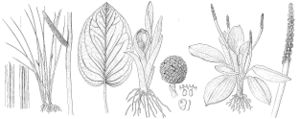Difference between revisions of "Acoraceae"
FNA>Volume Importer |
imported>Volume Importer |
||
| (5 intermediate revisions by 2 users not shown) | |||
| Line 42: | Line 42: | ||
|family=Acoraceae | |family=Acoraceae | ||
|illustrator=John Myers | |illustrator=John Myers | ||
| + | |illustration copyright=Flora of North America Association | ||
|distribution=Temperate Northern Hemisphere;tropical Asia at higher elevations;and sporadically introduced into Southern Hemisphere. | |distribution=Temperate Northern Hemisphere;tropical Asia at higher elevations;and sporadically introduced into Southern Hemisphere. | ||
|reference=grayum1987a;thompson1995b | |reference=grayum1987a;thompson1995b | ||
| Line 47: | Line 48: | ||
|publication year= | |publication year= | ||
|special status= | |special status= | ||
| − | |source xml=https:// | + | |source xml=https://bitbucket.org/aafc-mbb/fna-data-curation/src/2e0870ddd59836b60bcf96646a41e87ea5a5943a/coarse_grained_fna_xml/V22/V22_275.xml |
}}<!-- | }}<!-- | ||
-->[[Category:Treatment]] | -->[[Category:Treatment]] | ||
Latest revision as of 20:30, 5 November 2020
Herbs, perennial, wetland, usually with aromatic oil, especially in rhizomes. Rhizomes horizontal, creeping at or near surface, branched. Stems repent, branched rhizomes. Cataphylls absent. Leaves not differentiated into petiole and blade, equitant, sword-shaped, larger than 1.5 cm; venation parallel along length of leaf. Inflorescences: spadices, from 3-angled axis (peduncle fused with proximal portion of sympodial leaf, i.e., leaf encircling terminal inflorescence), distal sympodial leaf extending beyond spadix; true spathe absent; spadix nearly cylindric, tapering, apex obtuse. Flowers bisexual; tepals 6; stamens 6, distinct; ovariesy 1, (1–)3-locular, sessile; stigmas sessile (styles essentially absent), minute. Fruits berries; pericarp thin, leathery. Seeds 1–6(–14), from apex of locule.
Distribution
Temperate Northern Hemisphere, tropical Asia at higher elevations, and sporadically introduced into Southern Hemisphere.
Discussion
Acorus historically was recognized as an aberrant genus within Araceae, but much evidence supports its treatment as a separate family and the removal of this family from Arales (M. H. Grayum 1987). Other than the absence of a close association with Arales, the phylogenetic affinities of Acoraceae remain unclear. Evidence based on DNA sequences fails to show any close relationships between Acorus and other genera, and instead supports Acorus as the oldest extant lineage of monocotyledons (M. R. Duvall et al. 1993).
The removal of Acorus from Araceae is supported by the absence of a spathe and the unique vasculature of the structure traditionally interpreted as a spathe (T. S. Ray 1987). The structure that has been called a spathe in Acorus is not morphologically equivalent to the spathe of Araceae; instead it is interpreted as the distal part of the sympodial leaf. The proximal part of the sympodial leaf is adnate to the peduncle, forming a 3-angled axis that bears the inflorescence.
Genera 1, species 3–6 (2 species in the flora).
